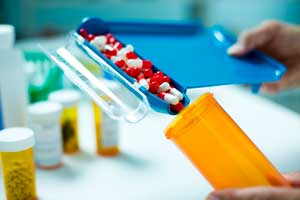
A national pharmacogenomics testing program could help reduce the thousands of extra days Singaporeans stay in hospital each year due to adverse reactions to medication.
© stevecoleimages/E+/Getty
About one in every ten patients is admitted to Singapore’s biggest acute-care hospital due to adverse reactions to medication, according to a study led by a team of researchers at A*STAR and Singapore General Hospital.
The team investigated the prevalence of serious medication side-effects among 1,000 patients admitted to Singapore General Hospital. They found a much higher incidence of adverse drug reactions (ADRs) than the three to nine per cent reported by other researchers in previous studies.
“The headline finding was that about 12 per cent of patients admitted to hospital had a severe side-effect to a medication — this included eight per cent where ADRs were the main cause of admission,” says Liam Brunham from the A*STAR Translational Laboratory in Genetic Medicine and the National University of Singapore, one of the authors of the study.
The most common culprits for ADRs in the study were cardiovascular drugs, anti-coagulants, anti-platelets, and chemotherapeutic drugs. Reactions included gastrointestinal symptoms, such as diarrhea; electrolyte abnormalities that can cause a life-threatening abnormal heart rhythm, and bleeding.
On average, the patients with ADRs were in hospital for four days, compared to a three-day stay for other patients. Eleven of these patients were admitted to high care, some of whom were left permanently disabled or dead. Two of the deaths were attributed to the drug reactions.
“If we extrapolate our finding to the entire country of Singapore, this amounts to an extra 48,000 days in hospitals each year simply because patients have had a side-effect to medications that a doctor has prescribed them,” says Brunham. This shows how considerable the problem is in terms of cost, morbidity and mortality.
Brunham’s group and collaborators in the Surveillance and Pharmacogenomics Initiative for Adverse Drug Reactions (SAPhIRE) program and the A*STAR Genomics Institute of Singapore are doing a follow-up study on the cost benefits of implementing a national pharmacogenomics testing program. This program would allow doctors to analyze a patient’s genetic makeup to predict if he or she is likely to have an adverse reaction to particular medications.
Alexandre Chan of the National University of Singapore, and principal investigator for the study, says that a national pharmacogenomics testing program would “reduce costs, prevent unnecessary admissions and reduce the morbidity associated with drug-induced adverse drug reactions.”
The A*STAR-affiliated researchers contributing to this research are from the Translational Laboratory in Genetic Medicine and the Genome Institute of Singapore.




